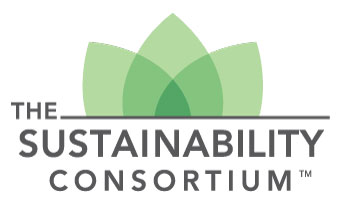The Sustainability Consortium Members Vote to Adopt the Greenhouse Gas Protocol Product Standard
Fayetteville, Arkansas and Tempe, Arizona – The Sustainability Consortium members, comprised of leading global retailers, manufacturers and consumer packaged goods (CPG) companies, voted to adopt the Greenhouse Gas Protocol Product Accounting and Reporting Standard (GHG Protocol Product Standard) that was developed through a global multi-stakeholder process by the World Resources Institute (WRI) and World Business Council for Sustainable Development (WBCSD). In order to fully understand the range of environmental effects on CPG supply chains, The Consortium plans to extend the GHG Protocol framework to address a full suite of impact categories. This decision marks an important step in creating global consistency for product level sustainability measurement standards.
The Consortium’s plans to use the framework of the GHG Protocol Product Standard and apply it to other impact categories which will facilitate easy access for companies in using life cycle assessment (LCA) in a consistent and accurate way. LCA is the main tool used by retailers, manufacturers, and raw material suppliers to measure, communicate, and reduce the environmental and social impacts associated with the production, use and end of life of consumer products. The Consortium will build on the GHG Protocol Product Standard by providing methodologies that are specific to individual industry sectors, including food and agriculture, electronics, and home and personal care.
“This milestone accomplishment propels us forward in our delivery of science based tools that will empower more sustainable production, buying and consumption patterns,” said Bonnie Nixon, executive director, The Sustainability Consortium.
“The decision made by The Sustainability Consortium members to adopt the GHG Protocol Product Standard holds great significance and is a tremendous achievement for WRI and WBCSD,” said Manish Bapna, managing director of WRI. “The Sustainability Consortium has emerged as a flagship initiative on product level sustainability measurement in the U.S. and internationally. This adoption builds significant momentum towards global harmonization of accounting for environmental and social impacts embodied in products.”
Bjorn Stigson, President, WBCSD, said: “Establishing one, harmonized methodology for product carbon measurement and reporting is key if businesses are to more effectively manage emissions. We are delighted that The Sustainability Consortium’s influential members voted in favor of the GHG Protocol Product Standard. This represents a key step forward to ensuring the WBCSD’s vision of the world’s population living well, and within the planet’s limited resources, being achieved.”
The GHG Protocol Product Standard is part of the GHG Protocol’s suite of international tools designed for businesses to measure and reduce greenhouse gas emissions. GHG Protocol is a partnership of the World Resources Institute (WRI) and the World Business Council on Sustainable Development (WBCSD) and develops its standards and tools using a broad, inclusive multi-stakeholder process with participation from businesses, government agencies, nongovernmental organizations, and academic institutions from around the world. The Sustainability Consortium represents a large user group for LCA and the GHG Protocol Product Standard, and plans on continuing to explore partnership opportunities with both WRI and WBCSD going forward.
About The Sustainability Consortium
The Sustainability Consortium is an independent organization of diverse global participants that work collaboratively to build a scientific foundation that drives innovation to improve consumer product sustainability. It develops transparent methodologies, tools and strategies to drive a new generation of products and supply networks that address environmental, social, and economic imperatives. The Sustainability Consortium advocates for a transparent process and system, not individuals or organizations. Arizona State University and the University of Arkansas jointly administer The Sustainability Consortium. Learn more at www.sustainabilityconsortium.org / Twitter: @sus_consortium
The Sustainability Consortium is a part of the Global Institute of Sustainability at Arizona State University and the Applied Sustainability Center at the University of Arkansas.
The Global Institute of Sustainability is the hub of ASU’s sustainability initiatives and home to the first of its kind School of Sustainability; it works to advance research, education, and business practices for an urbanizing world; visit: sustainability.asu.edu / Twitter: @asugreen
The Applied Sustainability Center at the University of Arkansas leads organizations in the retail and consumer goods industries toward sustainable practices that support an economy built around people, planet, and profit. The center is part of the Sam M. Walton College of Business and serves multiple disciplines across campus; visit: asc.uark.edu
About the World Resources Institute (WRI)
The World Resources Institute (WRI) is a global environmental think tank that goes beyond research to put ideas into action. We work with governments, companies, and civil society to build solutions to urgent environmental challenges. www.wri.org
About the World Business Council for Sustainable Development (WBCSD)
The WBCSD is a CEO-led, global coalition of some 200 companies advocating for progress on sustainable development. Its mission is to be a catalyst for innovation and sustainable growth in a world where resources are increasingly limited. The Council provides a platform for companies to share experiences and best practices on sustainable development issues and advocate for their implementation, working with governments, non-governmental and intergovernmental organizations. The membership has annual revenues of USD 7 trillion, spans more than 35 countries and represents 20 major industrial sectors. The Council also benefits from a network of 60 national and regional business councils and partner organizations, a majority of which are based in developing countries.

